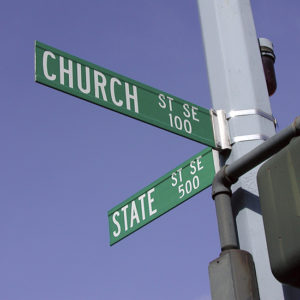Taxpayer Win: New Jersey High Court Declares DIY for Church Repairs

Between 2012 and 2015, Morris County, New Jersey awarded twelve religious institutions $4.6 million in taxpayer money to repair or maintain church buildings. But in a victory for the state’s taxpayers, the New Jersey Supreme Court unanimously ruled April 18 that the money granted to churches by Morris County violated the Religious Aide Clause of the state constitution and that the funding must come to an end.
The Freedom From Religion Foundation and one of their members filed a lawsuit in 2015 challenging Morris County’s longstanding practice of awarding grants that would allow for continued access to churches for worship. While a lower court determined that Morris County be allowed an exemption because the grant money was part of a historic preservation program, New Jersey’s highest court saw it differently.
“We find that the plain language of the Religious Aid Clause bars the use of taxpayer funds to repair and restore churches, and that Morris County’s program ran afoul of that longstanding provision,” Chief Justice Stuart Rabner wrote for the court.
As it turns out, the New Jersey Constitution is very clear on this subject. It provides that citizens can’t be required “to pay tithes, taxes, or other rates for building or repairing any church or churches, place or places of worship, or for the maintenance of any minister or ministry.”
All recipient churches have active congregations and several stated in their applications that the funds were to be used to fulfill religious objectives—specifying that the money would allow “continued use by our congregation for worship services,” and “continued safe public access to the church for worship.” Rabner clarified that “the churches are not being denied grant funds because they are religious institutions; they are being denied public funds because of what they plan to do—and in many cases have done: use public funds to repair church buildings so that religious worship services can be held there.”
While the New Jersey Supreme Court upheld their constitution and the church-state wall, opponents are considering an appeal to the federal court system, reigniting a national debate over taxpayer money being used to benefit houses of worship. John M. Bowens, an attorney representing the Morris County Board of Freeholders said, “To me it was very clear from Trinity Lutheran, that where the state has a program opened to basically all of its citizens or some of the citizens, you can’t exclude an applicant solely because of their religion or their religious beliefs.”
The 2017 Supreme Court decision in Trinity Lutheran Church of Columbia, Inc. v. Comer held that the Missouri Department of Natural Resources’ refusal to give money to Trinity to resurface a playground at its learning center violated its freedom to exercise its religion. Even though the activities at the Trinity Learning Center were explicitly described as teaching “a Christian world view to children of members of the Church [sic], as well as children of non-member residents,” the court came to the conclusion that requiring the government to consider religious institutions for publicly funded programs does not violate the Establishment Clause. In a footnote, Chief Justice Roberts said the ruling wasn’t meant to be applied in cases not specifically involving playground renovations. “This case involves express discrimination based on religious identity with respect to playground resurfacing. We do not address religious uses of funding or other forms of discrimination.” But now, as expected, the limits of this decision are being tested.
If the county is truly interested in neutral historical preservation, perhaps one solution would be to limit funding to only repair external facades. But that’s not what’s happening. The state Supreme Court found that churches were explicit in using the money to repair stained-glass windows, chapels, and other areas that specifically fulfill religious objectives. This is a clear violation not only of New Jersey’s Constitution, but of the federal Establishment Clause that lays the foundations for the separation of church and state. As a secular nation, we have the responsibility to ensure that the government obstructs no religion (as long as the religion doesn’t violate rights) and endorses no religion. So long as church-state separation is maintained in our Constitution, it is essential that we uphold the religious liberty rights of all taxpayers.
